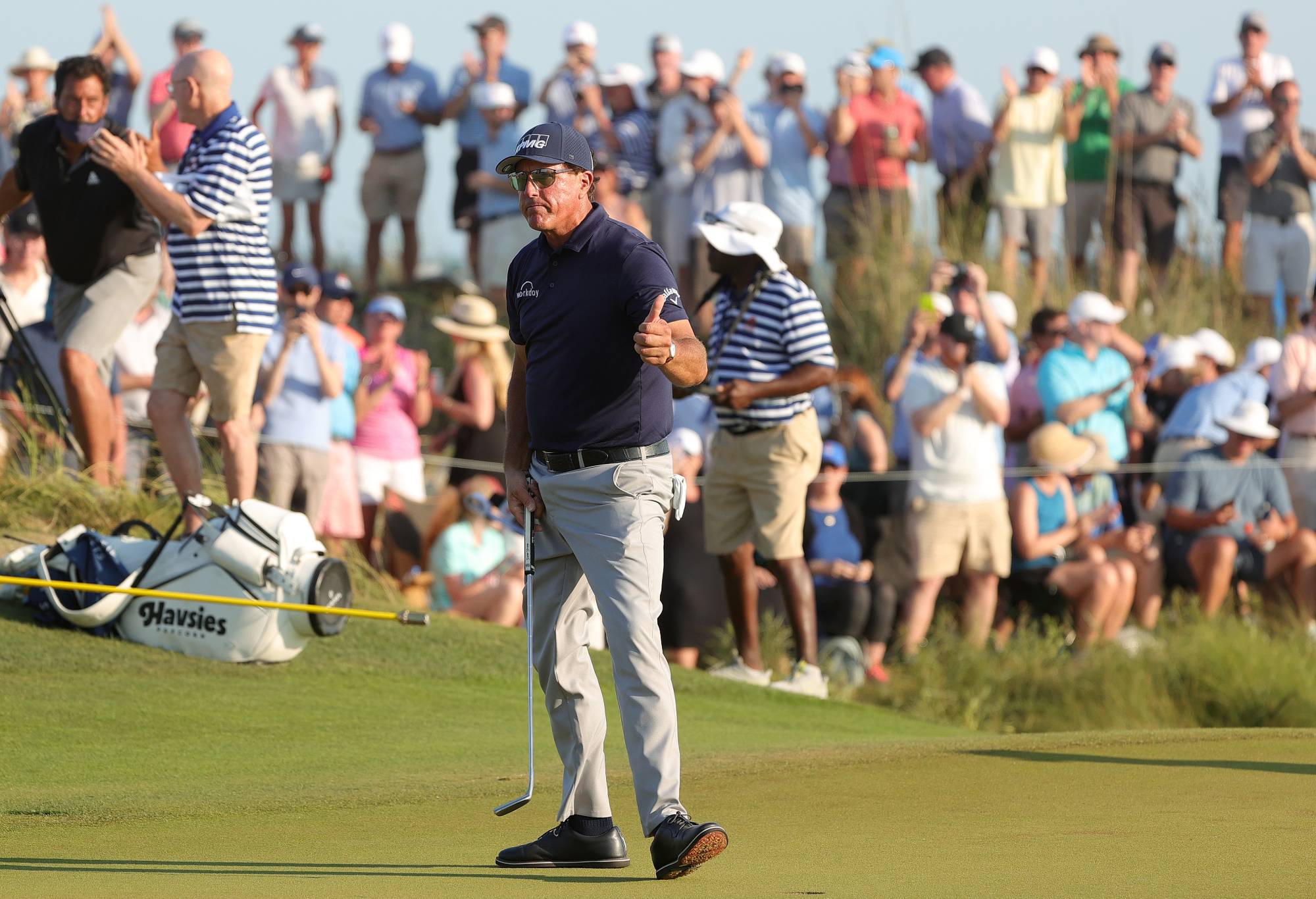Phil Mickelson has insisted he never bet on the Ryder Cup after it was alleged he wanted to do so while playing in the 2012 contest at Medinah.
In an excerpt from the forthcoming book: “Gambler: Secrets from a Life at Risk,” by Billy Walters, Walters recounted details of the bets he and Mickelson made together.
Walters writes Mickelson was so confident the United States would regain the Ryder Cup in 2012 that he asked Walters to bet $US400,000 for him on that result.
“I could not believe what I was hearing,” Walters wrote.
“‘Have you lost your f…ing mind?’ I told him, ‘don’t you remember what happened to Pete Rose?'”
The former Cincinnati Reds manager was banned from baseball for betting on his own team.

Phil Mickelson (Photo by Stacy Revere/Getty Images)
“‘You’re seen as a modern-day Arnold Palmer,’ I added. ‘you’d risk all that for this?’ I want no part of it.”
He said Mickelson replied: “Alright, alright.”
“I have no idea whether Phil placed the bet elsewhere. Hopefully, he came to his senses,” Walters wrote.
Walters added he had “no idea” if Mickelson made such a bet, one which would have lost as Europe recovered from 10-6 down to win by a point.
Mickelson initially declined to comment after his pro-am round ahead of the LIV Golf event in New Jersey, but later released a statement on social media.
“I never bet on the Ryder Cup,” Mickelson said.
“While it is well known that I always enjoy a friendly wager on the course, I would never undermine the integrity of the game. I have also been very open about my gambling addiction.
“I have previously conveyed my remorse, took responsibility, have gotten help, have been fully committed to therapy that has positively impacted me, and I feel good about where I am now.”
Walters said Mickelson told him he had two offshore accounts, and that Mickelson had limits of $US400,000 on college games and $US400,000 on the NFL.
He said, based on his detailed record and additional records provided by sources, Mickelson’s gambling between 2010 and 2014 included:
— Betting $110,000 to win $100,000 on 1,115 occasions, and betting $220,000 to win $200,000 on 858 occasions. That alone comes out to just over $US311 million ($A474 million).
— Mickelson in 2011 made 3154 bets for the year and on one day (June 22) he placed 43 bets on Major League Baseball games that resulted in $US143,500 ($A219,000) in losses.
— He placed 7065 bets on football, basketball and baseball.
Days before the first LIV event last year, Mickelson told Sports Illustrated he was embarrassed by his “reckless” gambling but insisted his decision to join the Saudi-funded breakaway had nothing to do with financial difficulty.
“My family and I are and have been financially secure for some time,” the six-time major winner said.
“My gambling got to a point of being reckless and embarrassing. I had to address it. And I’ve been addressing it for a number of years. And for hundreds of hours of therapy.
“Gambling has been part of my life ever since I can remember but about a decade ago is when I would say it became reckless. It isn’t a threat to me or my financial security. It was just a number of poor decisions.”
Walters, widely regarded as America’s most famous gambler, said he ended his betting partnership with Mickelson in 2014. Two years later, Mickelson was a relief defendant in Walters’ insider trading case.
Mickelson was never charged and had to repay about $US1 million ($A1.5 million) he made off a stock deal.
Walters was convicted and sentenced to five years in prison. He said he could have avoided prison had Mickelson told a “simple truth.”
Walters said he never told Mickelson he had inside information on Dean Foods stock.
“All Phil had to do was publicly say it. He refused,” Walters wrote.
“The outcome cost me my freedom, tens of millions of dollars and a heartbreak I still struggle with daily. While I was in prison, my daughter committed suicide – I still believe I could have saved her if I’d been on the outside.”
© AAP





























































































